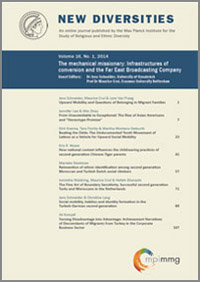Historical Trajectories and Ambivalences of Turkish Minority Discourse
by Markus Dressler (Bayreuth University)
To cite this article: Dressler, M. (2015). Historical Trajectories and Ambivalences of Turkish Minority Discourse. New Diversities, 17(1), 9–26. https://doi.org/10.58002/7vwe-xc55
This article inquires into the work of modern minority discourse and politics that delineates the boundaries of the Turkish national subject as Turkish-Islamic. It argues that the Turkish minority concept, which is based on imaginaries that justify claims of national and religious sameness and difference, needs to be understood against the backdrop of its historical formation. In the late Ottoman Empire, the socio-political grounds of communal sameness/difference were radically transformed. In this process, ethno-religious millets turned into national millets, culminating in the re-conceptualization of the non-Muslim millets as religious minorities in the early Republic of Turkey. The article further shows how the restriction of minority rights to non-Muslims puts the Turkish concept of minority/azınlık at odds with international conventions on minority discourse. It creates ambivalences with regard to citizenship and nationhood status not only for them, but also for disadvantaged Muslim subgroups, such as the Alevis. Drawing in particular on the case of the Alevi community, I will demarcate the contested entry and exit points of nationhood and religion, in relation to which the minority label is organized in Turkey. Having to negotiate the pitfalls of Turkish identity discourses, Alevis employ the semantics of international human rights discourse in their quest for equal rights and recognition, while rejecting the minority label.
Keywords: minority discourse, Turkey, Alevism, Turkish nationalism, Turkish secularism, religion in the Ottoman Empire, religion politics
|
